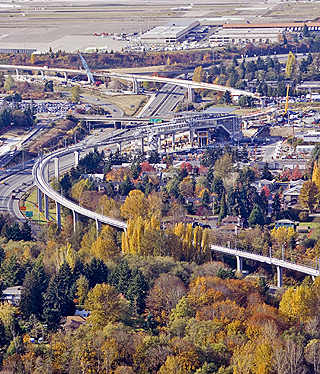
AMEC Earth and Environmental
Specialty: Environmental work such as remediation, mitigation, permitting and fish protection; geotechnical work; materials testing and inspection
Management: Jim Shellooe, Seattle operations manager; Doug Smith, senior vice-president and regional manager (Portland office)
Founded: 1974 (Puget Sound offices)
State headquarters: Kirkland
2007 revenues: $17.9 million (Washington state)
Projected 2008 revenues: “We anticipate reasonable growth”
Current projects: Environmental compliance for the Interstate 405 Kirkland Nickel project; light-rail foundation work for Sound Transit; materials testing for Bellevue’s Bravern development

Photo courtesy of AMEC Earth and Environmental AMEC Earth and Environmental performed geotechnical design for Airport Link.
|
A global firm of 22,000 employees, AMEC has five offices in Puget Sound with 700 staffers.
AMEC recently acquired Geomatrix, a technical consulting and engineering firm based in Oakland, Calif., for $85 million. Geomatrix has two Puget Sound offices that will “enhance our capabilities in seismic engineering,” said Jim Shellooe, AMEC’s Seattle operations manager.
AMEC looks for complicated projects that make best use of its capacity.
“We find those to be the most interesting for staff and the most challenging and the best use of the depth of resources we have,” Shellooe said.
Since so much of its work is tied to big environmental or real estate projects, capital investment and real estate development are some of the biggest drivers of AMEC’s business. While there have been a lot of changes in that market recently, “we feel like we’re in a good position to respond to the changes,” Shellooe said.
Alternative energy
The country’s increased demand for energy will drive some of AMEC’s future growth, both in Puget Sound and elsewhere.
Shellooe predicts AMEC will be helping develop alternative energy sources as well as supporting existing ones.
“And there are other areas where companies and agencies are looking to make their energy consumption more efficient,” he said.
Shellooe teaches a course in environmental law and regulation, a field that is getting more and more complicated as permitting standards get more stringent.
“We continually get more sophisticated about approaches to what it actually takes to develop properties,” Shellooe said. But as the field gets more complicated, he’s seeing more and more students become interested in it.
“That’s the kind of thing you see when there’s growth,” he said.